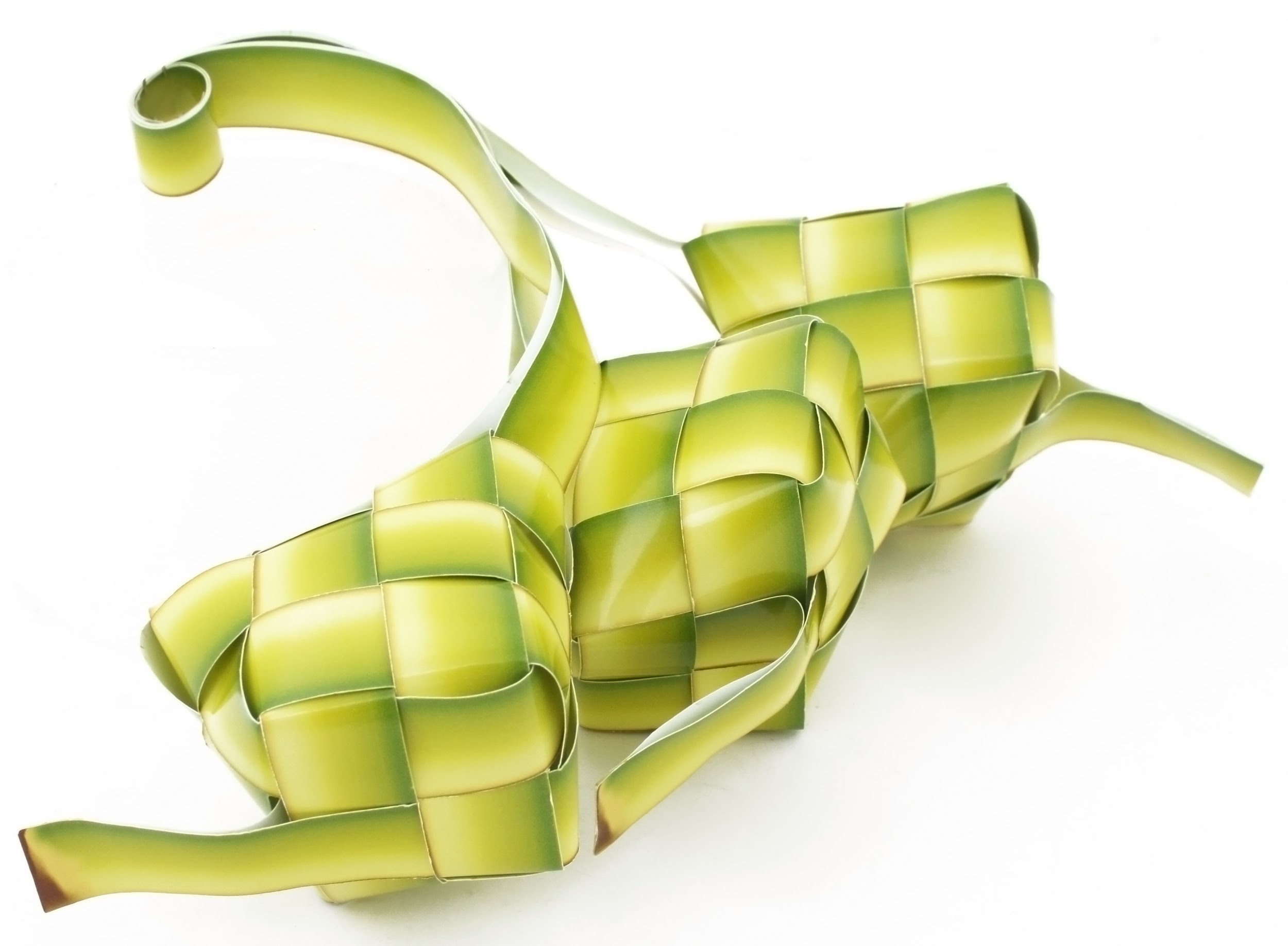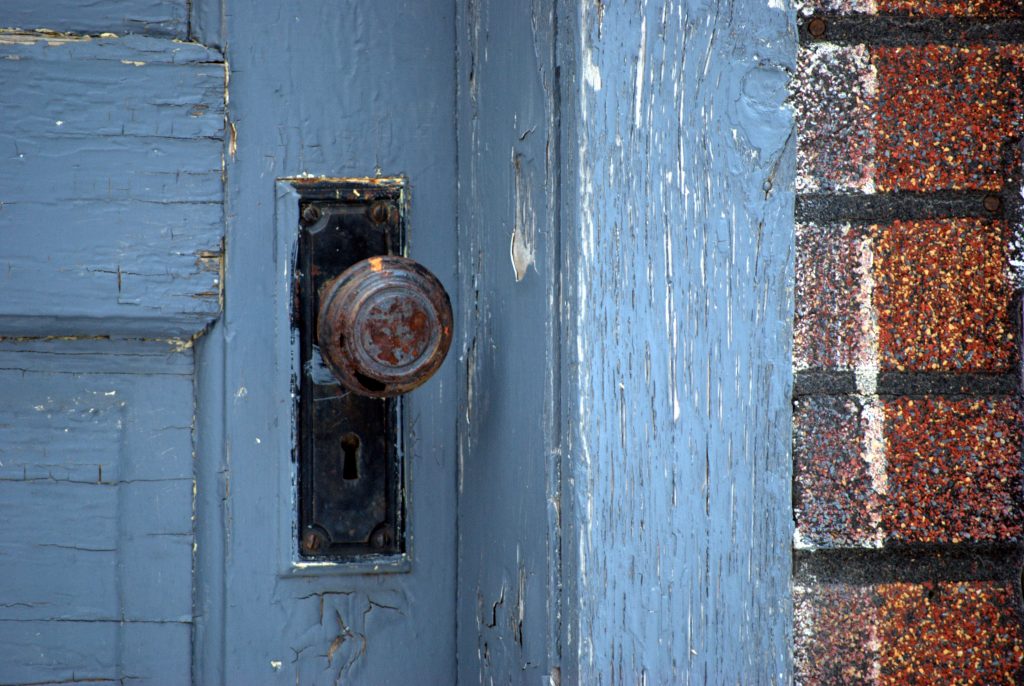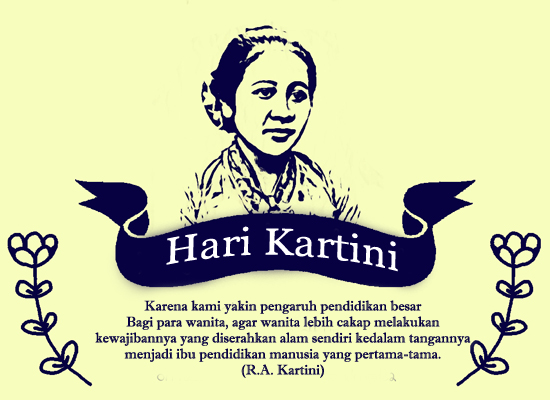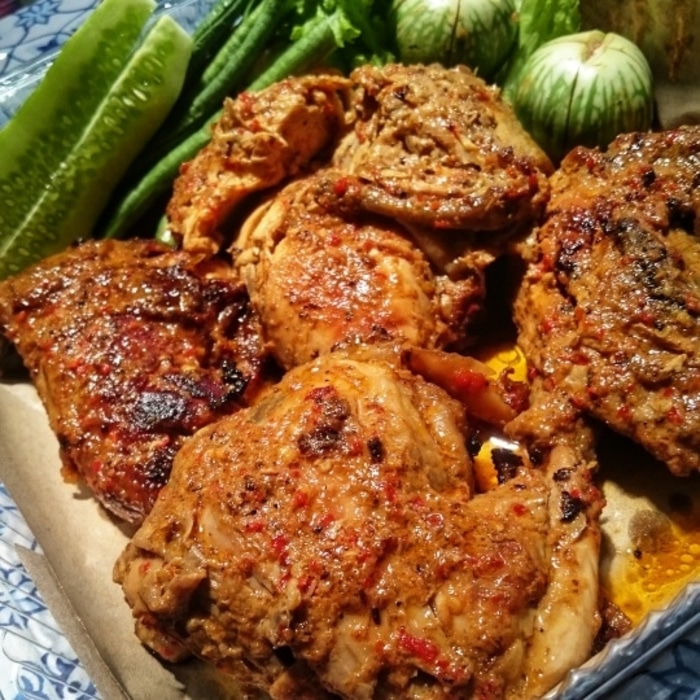On February 28, 2025 Muslims in Indonesia and throughout the world started their annual fast that takes place during the month of Ramadan, the ninth month of the Muslim calendar. According to the Muslim Hijrah calendar the year is made up of twelve lunar months lasting 29 or 30 days. It is about eleven days shorter than the Gregorian calendar. Therefore, Ramadan moves through all months of the year taking about 33 years to complete the cycle.
During Ramadhan Muslims must refrain from eating, drinking, smoking and sexual relations between sunrise and sunset. It is believed that fasting heightens spirituality and develops self-control. Each day a special effort is made to say the five daily prayers. The morning prayer is said after sahur, the pre-dawn meal and the fast is broken at sunset.
The end of Ramadan is a joyous occasion called Idul Fitri, commonly referred to as Lebaran in Indonesia, and is celebrated with special prayers, feasts, sweets and gift giving to celebrate the successful completion of the fasting month. The Arabic meaning of Idul Fitri is “becoming holy again”. Lebaran is a public holiday all over Indonesia, and in 2025 the holidays are expected to fall on March 31 – April 1. The exact date is determined by the sighting of the new moon indicating the beginning of the tenth month Syawal. The government makes an official announcement on the eve of Ramadan and Idul Fitri so that the faithful know when to begin and end the fasting month.
You will notice a growing excitement amongst your Muslim friends, colleagues and staff as Lebaran approaches and they make plans for their special celebration. A government regulation requires that a one month bonus be paid to all household staff and salaried employees prior to the holidays. This bonus should be given a couple of weeks before Lebaran in order to allow them plenty of time to buy new clothes, gifts and special treats to take home for their relatives in the village. If your household staff have worked for you for only part of the year the bonus given may be pro rata, however if you are happy with your staff it is a good idea to be generous in determining the amount that you give them in order to create goodwill.
Muslims traditionally give charity donations at Ramadhan for distribution to the poor and needy at Lebaran. The obligatory poor tax called zakat that is paid by Muslims should total 2.5% of one’s income. Zakat is paid to charitable organizations, neighborhood groups or through direct distribution to the poor and needy in the neighborhood. There are likely to be more beggars than usual in the streets of Jakarta during Ramadhan in order to benefit from this tradition.
This is the time of year when Muslims usually buy new clothes and various civic, charitable neighborhood organizations will hold pasar amal or sales of goods, especially clothing at discounted prices to help the poor celebrate the holidays with new clothing and special foods. For the wealthy, Lebaran is a time to show off their newest fashionable Muslim apparel.
Business colleagues or associates may deliver elaborately decorated parcels to Muslims in the week prior to Lebaran. They are usually arranged in a rattan or wood basket and contain food, small household appliances or dishes.
Shops throughout the city sell greeting cards, which many people send to their Muslim friends. Designs of Lebaran cards should not depict people or animals thus geometric designs, mosques, traditional textiles or ketupat (traditional Lebaran food) are common. Many cards have the date of 1 Syawal 14__ H written on the card. You need to fill in the appropriate year in the space. In 2024 the Hijrah year will be 1445. The greeting inside Lebaran cards is usually: “Selamat Hari Raya Idul Fitri Maaf lahir dan batin”
This means: “Happy Idul Fitri. I am sorry from the bottom of my heart for my wrong doings in the past year.” It is becoming increasingly common to use more modern forms of greeting, in particular text messages via hand phones.
You will notice a growing excitement amongst your Muslim friends, colleagues and staff as Lebaran approaches and they make plans for their special celebration. A government regulation requires that a one month bonus be paid to all household staff and salaried employees prior to the holidays. This bonus should be given a couple of weeks before Lebaran in order to allow them plenty of time to buy new clothes, gifts and special treats to take home for their relatives in the village. If Just prior to Lebaran a mass exodus from Jakarta of over 5 million people occurs as residents return to their villages and hometowns to celebrate with family and friends bearing gifts or money earned during the previous year. This is a strongly held tradition and travellers happily endure a lot of hardships and inconveniences in overcrowded cars, buses and trains often with inflated prices. The logistics of this exodus cause headaches for the government each year. During the Lebaran period Jakarta’s main streets are surprisingly empty.
Depending on where their homes are, your household staff will want to take one to two weeks off at Lebaran to visit their family in the village and you’ll be left to cope without a cook, maid, gardener and driver. You can ask your staff members to arrange to stagger their time off so that you will have at least one staff member available at all times, except for the two days of Idul Fitri. It’s difficult to schedule your own travel in Indonesia at this time as all forms of transport are heavily booked well in advance.
Idul Fitri begins with mass prayer gatherings early in the morning at mosques and large open areas around the country. On the walk home from the prayer, quick visits are made to greet friends in the neighborhood. Visits are made to the graves of deceased family members to pay respects, clean the graves and leave flowers. This is also done just prior to the start of Ramadan but not during the fasting month.
Later in the day, with everyone dressed in their new clothes, visits are made to close family members around town, starting with one’s parents. At each house drinks and cookies or snacks are served until you can hardly eat any more. These customs may entail several days of visiting relatives and often there will be a gathering of family members at the senior-most relative’s house. Many people also take the opportunity of the Lebaran holiday to visit recreational parks.
Lebaran is a joyous time for mutual forgiveness when pardon is asked for all wrongs done during the past year. Begging of forgiveness for any transgressions or slights in the past year is expressed during visits with the words Mohon maaf lahir dan batin. In traditional Javanese families the younger person kneels and bows their head to the elders’ knees and asks for forgiveness demonstrating the respect given by young people to the family elders.
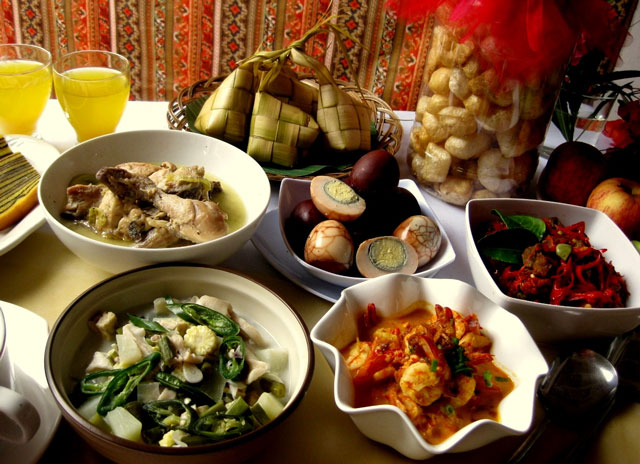
Special dishes are traditionally served to celebrate Lebaran, in particular ketupat or compressed rice cooked in a rhomboid shaped casing made of young coconut fronds that are still light green in color. Intricately woven by nimble fingered experts who can complete the weaving in a few seconds, the empty casings are sold to the public in bunches at traditional markets. The casings are filled with uncooked rice then steamed and left to cool. The coconut leaf casing gives a special flavor to the rice. The ketupat is cut open, removed from the casing and cut into small chunks. It is served with various accompanying dishes usually chicken, meat and vegetables cooked in spicy coconut milk, such as opor ayam (mild chicken curry) and sambal goreng (vegetables with chilies in coconut milk).
During the weeks after Lebaran many groups hold halal bihalal gatherings where employees from a company, friends, colleagues or members of an organization gather to share a meal and ask each other’s forgiveness. Non-Muslims are often invited to participate in these gatherings also. The celebration of Lebaran is a very special occasion for Muslims that they are looking forward to now with great anticipation.
What has been your experience of this very special religious festival in Indonesia? Do share in the comments below…

